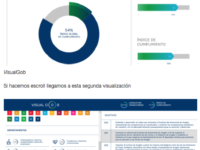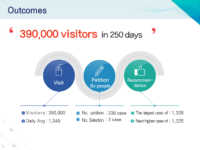Bağcılar Municipality has implemented an Algorithmic Decision Systems model for evaluating public services to maximizing the value proposition and satisfaction level at the minimum cost. This model enables the municipality to make decisions regarding the investment worthiness of its current and planned services and activities, as well as the direction of improvements needed in existing products and services, both in the eyes of stakeholders and the organization.
Innovation Tag Opengov: accountability
The initiative was developed in response to the dispersion of sources for consulting information on the documents produced by the national government. The solution, a data catalog (datalog), generates an institutional memory of open consultation on different aspects that the outgoing government delivers to the incoming one. The tool is innovative in applying machine learning technologies to process, organize and present a large volume of documentary information in an agile and simple way.
VisualGOB is an objective, visual and intuitive digital accountability tool that represents a breakthrough in the field of transparency. With it, it is possible to consult the government's progress almost in real time, and to follow the evolution of the 156 strategic objectives of the Aragon Government Plan. In addition, VisualGOB became a scorecard accessible to all.
In Uganda, traditional community engagement events called ‘barazas’ have been adopted and adapted by CoST - the Infrastructure Transparency Initiative to promote meaningful participation and improve delivery. CoST Uganda initially began to use the events with a focus on infrastructure delivery in Wakiso District, outside Kampala to help to rebuild a broken relationship between residents and officials and rectify key issues on an infrastructure project.
The National Open Data Portal is a single access point for all data produced by public institutions for the purpose of :
- Complying with the provisions of the organic Law on access to information in its section on the proactive publication of public data in open format;
- Promoting the reuse of public data to stimulate innovation and the creation of new value-added services aiming to enhance the economic growth; and
- Strengthening the transparency and integrity of governmental activities.
Case Study
Libellula – a civic monitoring lab and a format to build and sustain a local civic monitoring…
Libellula is a laboratory for civic monitoring of local public spending and a format to build and sustain a local civic monitoring coalition. The first lab is based in Messina, Sicily. Moving from monitoring a specific case, Libellula aims at building a civic multi-stakeholder coalition which, while monitoring, simultaneously cultivates skills and capabilities of those involved to advocate for transparent and collaborative public spending in order to address the misuse of public money.
Case Study
Monitoring of the Implementation of the Access to Information Act in the Federal Executive Branch
With the maturing of the Transparency Policy in the Brazilian Federal Executive Branch, there was a need to broaden the assessment of the implementation of the Access to Information Act. The innovation here lies in the methodology adopted, which was previously quantitative and is now also qualitative, allowing an improvement in the answers provided to citizens and the extension of the transparency culture, favoring all stakeholders: public bodies under assessment, citizens and the Government.
Previous government-led safety inspection systems were not reflective of social needs and public interest in the foods and drugs that should be on the market.
The new system allows people not only to make policy proposals but to actively participate in food and drug inspections as well.
People are empowered to request inspection or examination of products when there is a growing public concern over the safety of the food or drug in question. The government will respond with an inspection or…
Our Court launched a twitter account, seeking to rebuild trust. In Argentina, the justice system is the institution with the lowest public trust. Through this account we publish every judgement, hearings, the staff resumes and the Judge's personal leaves. This is not the norm in our country and constitutes a pioneering innovation that demands deep cultural change from public servants and our users too. We improved engagement with the public and inspire other teams to deliver a more efficient…
As a criminal court judge I felt the need to implement concrete actions to establish a new way of adjudicating in my country (Argentina) by relying on Open Government’s principles. Among some of the implemented policies, we publish all of the court's decisions, the court hearings' agenda, statistics and reports on the administration of the court and the biographical information of the court's employees. We do so by using our Twitter (@jpcyf13) and YouTube accounts.





